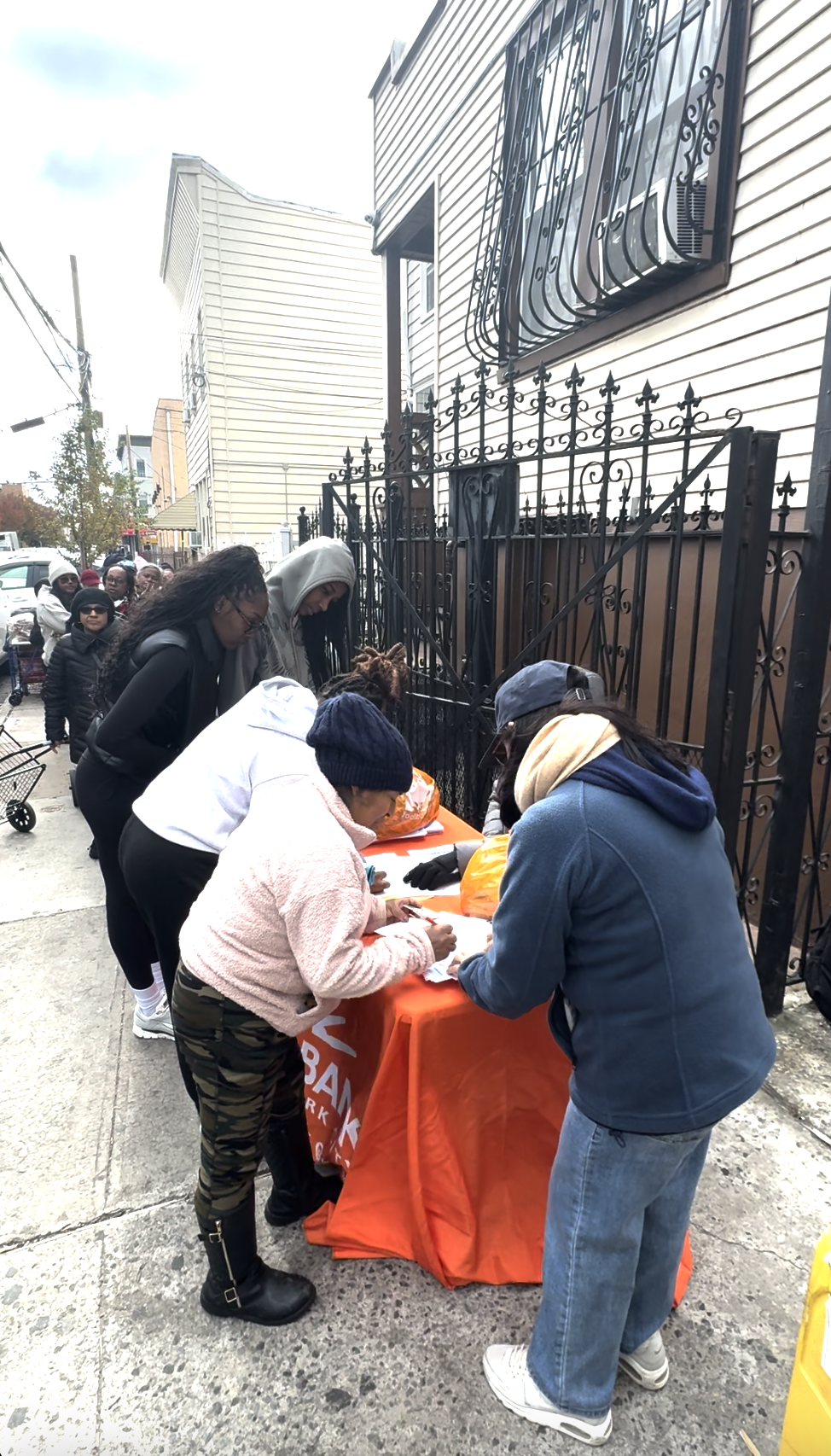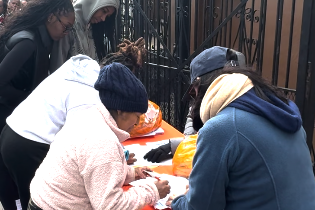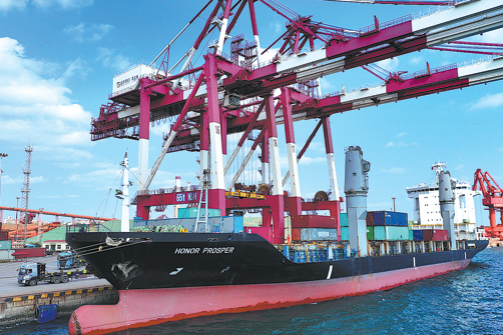Federal workers feel squeeze for food during shutdown


On a cold, windy day outside a church in Queens, New York, people stood in line — some with carts to carry more items, others wearing sunglasses and masks, embarrassed to be recognized as local and national media flooded the street.
The line on Oct 28 was for federal workers seeking assistance from a food bank. Nothing fancy — just produce like peppers, onions, cucumbers and carrots.
Among them was Jacquelin, who said the shutdown had greatly impacted her and her family. She explained that she has "been asked to increase productivity much higher than it was before" at work, and now she's "demanded to work more hours without pay."
Jacquelin became emotional and choked up several times while speaking to China Daily.
"Not being able to celebrate my daughter's birthday or postponing celebrating Halloween, maybe Thanksgiving or Christmas," she said, her voice breaking.
"It's very heartbreaking. Having to explain to your child, we don't have money to maybe go and get you a slice of pizza … or not buy the things that you need to eat, that you used to eat at home," she said.
The federal government shut down on Oct 1 after a standoff over funding for healthcare and other policy priorities. Negotiations have since stalled, leaving hundreds of thousands of federal workers like Jacquelin in limbo.
According to the Bipartisan Policy Center, about 1.4 million federal employees are currently not receiving pay. Among them, at least 670,000 workers have been furloughed, while roughly 730,000 continue to work without pay.
Christina Dechabert, an employee with the Transportation Security Administration at John F. Kennedy International Airport, said, "it's draining" to keep working without getting paid.
"Having to come to get food so our family could survive. Gotta move money, gotta move your savings. Shouldn't have to do that," said Dechabert, who rarely visits food banks except during crises like this. The last time she did was during the 35-day government shutdown in 2018.
But even then, she said, "it was a little bit easier" compared with this shutdown, since "things are more expensive" now.
"Our savings are supposed to be for when you turn 65, 70 and you're able to fall back on something and enjoy retirement. Right now you can't enjoy anything because we have to stand in lines to get food so we could provide for our families," Dechabert added.
A woman in the line who didn't wish to reveal her identity, and who is currently on furlough, said, "We are being held as collateral damage in the process, and it's just not fair."
This is not only a scene you witness in New York. Across the nation, federal workers are facing similar food insecurities. A China Daily reporter in Washington, D.C. on Oct 24 attended a food distribution event for federal workers where cars lined up so far you couldn't see the end of it before the event even started.
For many in the line, the shutdown isn't just a delay in paychecks. It's a struggle to put food on the table, a concern echoed by advocacy groups tracking the impact of federal benefits cuts.
Supplemental Nutrition Assistance Program
Zac Hall, senior vice-president of programs at the Food Bank for New York City, said, "As the government shutdown continues, Food Bank for NYC is not only concerned about the impact paycheck disruptions are having on federal workers, but we're also extremely troubled by the withholding of November SNAP benefits, which has never happened in this country".
The US Department of Agriculture announced that SNAP benefits, which more than 40 million Americans rely on, or roughly one in eight people in the country, wouldn't be distributed on Nov 1. Hall said, "this crisis will further deepen food insecurity."
In its statement, the USDA said: "We are approaching an inflection point for Senate Democrats. They can continue to hold out for healthcare for illegal aliens and gender mutilation procedures, or reopen the government so mothers, babies and the most vulnerable among us can receive critical nutrition assistance."
Dozens of states, including California, Massachusetts and New York, have filed lawsuits against the Trump administration over the SNAP cut, highlighting the tension between federal and state governments, as well as the growing partisan rift as millions face the combined pressures of unpaid wages and food insecurity.
Two federal judges on Oct 31 ruled the Trump administration must continue to fund SNAP amid the shutdown. Trump suggested he will comply but needs more clarification. It's currently unsure how long the process will take. Treasury Secretary Scott Bessent said to CNN on Sunday that the benefit could go out by Wednesday.
"This isn't politics, it's people. We urge Congress and the USDA to ensure benefits are fully funded and uninterrupted," said Nicole Hunt, director of public policy and advocacy at Food Bank For New York City.
Dozens of states, including California, Massachusetts and New York, have filed lawsuits against the Trump administration over the SNAP cut, highlighting the tension between federal and state governments, as well as the growing partisan rift as millions face the combined pressures of unpaid wages and food insecurity.
While the SNAP disputes highlight the human and political stakes, the shutdown is also exacting a measurable toll on the US economy.
The nonpartisan Congressional Budget Office warned on Oct 29 that the US economy is poised to suffer significant damage from the ongoing government shutdown. The agency estimated a permanent loss of $7 billion in economic output if the shutdown ends this week. If it extends six weeks, through Nov 12, losses could reach $11 billion. An eight-week shutdown, through Nov 26, would bring the total to about $14 billion.
The shutdown's economic impact is compounded by interruptions to federal operations. A shutdown disrupts federal administrative services by furloughing large numbers of employees and halting nonessential operations. Among the services affected are the processing of new Social Security card applications, certain student loan functions, Internal Revenue Service forms, and Freedom of Information Act requests.
The travel industry is also feeling the strain. Sixty percent of Americans said they would cancel or avoid trips in the event of a shutdown, according to the US Travel Association — a decision that might be prudent, given that travel has become increasingly difficult. National parks are facing partial closures and limited access, while airports are reporting mounting delays caused by staffing shortages.
At Ronald Reagan Washington National Airport in Arlington, Virginia, average delays have reached 90 minutes. Orlando International Airport reported average delays of two and a half hours. The National Air Traffic Controllers Association said many of its members have taken second jobs to support their families during the shutdown.
Federal employees who have continued working during the shutdown will eventually receive backpay once the government reopens. But the law offers no such protection for government contractors.
According to the US Chamber of Commerce, roughly 65,500 businesses hold contracts with the federal government — providing everything from high-tech equipment to office supplies and landscaping services. Those firms are collectively losing an estimated $3 billion each week. With the shutdown now stretching beyond four weeks, total losses have climbed to about $12 billion.
Aaron Pacitti, a professor of economics at Siena College, told China Daily that he believes the economic impact of the government shutdown is relatively small.
"In a $30 trillion economy, a couple billion dollars of losses might sound big in the grand scheme of things, but it's an exceptionally small overall percentage," he said. "The estimate is that for every 2.5 months the government is shut down, it subtracts one percentage point from gross GDP."
Federal workers who have gone without pay will be legally entitled to backpay once the government reopens.
"Those furloughed government workers, they are not getting that money back. That's where the permanent loss happens."
Even though the shutdown may not significantly affect the US economy as a whole, Pacitti noted that it disproportionately harms lower-income working-class people, who he estimates make up 10 to 15 percent of the population.
"One of the reasons that the shutdown did occur was because there was a disagreement about the subsidies for buying health insurance once the the Affordable Care Act expired, so now low income individuals who rely on the Affordable Care Act for healthcare are going to find that their premiums are going to double," he said, reiterating that the SNAP would be suspended starting Nov 1.
"So even though the shutdown as a whole is going to have a relatively small effect on the economy, it's going to hurt the lowest income Americans the hardest."
On the border scheme, Pacitti said: "It's unfortunate that government shutdowns are just becoming the normal way … (if) shutdowns become a more normalized part of how the US government operates its going to really start eroding the credibility of the US political system, and that can have negative effects on international relations."
"I think this is part of a broader political story of the US political system starting to crumble and become less reliable."
Those warnings of political erosion are mirrored in the current deadlock in Washington, where negotiations between the parties remain stalled. The Senate adjourned on Oct 30 and will not reconvene until Nov 3, extending the shutdown to at least 34 days — tying the record for the longest in US history, set in 2018 during Trump's first term.
Senate Republican Leader John Thune said that communications on the shutdown have picked up and described a "higher level of conversation," signaling a cautious note of optimism.
For those waiting for food outside a church in Queens, Pacitti's analysis of a fraying political system and widening inequality rang true: The cost of Washington's stalemate was being paid most dearly by those with the least to spare.
As the lady who refused to identify herself waited quietly in line, her black wool coat still pristine despite the wind and cold, she said she didn't know how long the shutdown would last.
"I've called Trader Joe's and places … No one is doing anything about it yet," she said. "I'm grateful that this is the start of something to help people."

































